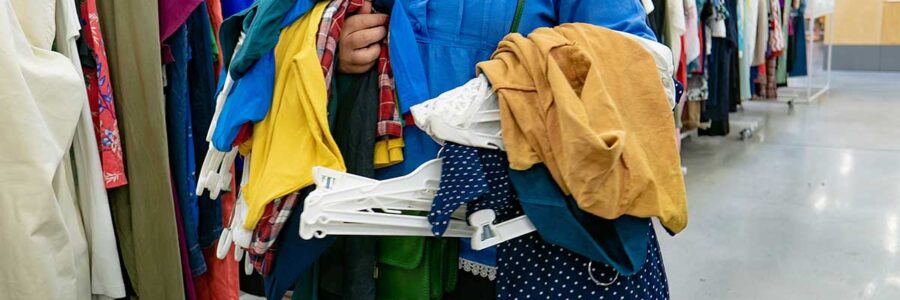Fast fashion offers a quick and inexpensive way to stay on-trend, but it comes with hidden dangers that many consumers overlook. The recent SNL skit shed light on these dangers in a humorous yet impactful way, highlighting the serious issue of toxic chemicals in our clothing. If you saw the skit, you might remember the moment when an actor’s nose started bleeding, a stark representation of the health risks posed by toxins like lead in our clothes.
Several fast fashion companies have been found using harmful substances, including:
☢️ PFAS (Per- and Polyfluoroalkyl Substances): These chemicals are used to make fabrics water and stain-resistant but are linked to severe health problems, including organ damage and asthma.
☢️ Lead: Commonly used in dyes, lead exposure can cause brain and nervous system damage, especially in children, leading to developmental issues.
☢️ Phthalates: These chemicals, used to soften plastics, are present in clothing and have been linked to hormonal disruptions and reproductive health problems.
The Health Risks of Toxic Clothing
The health effects of these substances are profound and varied:
- PFAS: Known as “forever chemicals,” they can build up in the body over time, leading to liver damage, thyroid disease, decreased fertility, high cholesterol, and cancer.
- Lead: Even low levels of exposure can cause developmental delays, learning difficulties, irritability, weight loss, sluggishness, abdominal pain, and seizures.
- Phthalates: These chemicals disrupt the endocrine system, potentially leading to birth defects, developmental disorders, and hormonal imbalances affecting fertility and weight.
The impact of fast fashion extends beyond health, affecting the environment and labor practices. Many brands are notorious for poor working conditions and unfair wages.
Choosing Safe, Toxin-Free Clothing
Thankfully, many brands are dedicated to providing safe, toxin-free, and ethically made clothing. When shopping, look for the following certifications to ensure your clothes are free from harmful chemicals:
- GOTS (Global Organic Textile Standard) ensures that textiles are organically produced and processed in environmentally and socially responsible ways.
- OEKO-TEX Standard 100: Certifies that every product component has been tested for harmful substances.
- Bluesign: Ensures sustainable textile production, making products safe for the environment, workers, and consumers.
- Fair Trade Certified: Guarantees fair labor conditions and wages.
Recommended Brands for Safe Clothing
- Pact: Offers a range of stylish and comfortable clothing made from GOTS-certified organic cotton in Fair Trade Certified factories.
- Patagonia: Known for its environmental commitment, Patagonia uses Bluesign-approved materials and ensures fair labor practices.
- Eileen Fisher: Focuses on sustainability with a transparent supply chain and the use of organic and recycled materials.
- Thought Clothing: Provides fashionable options made from natural and recycled fabrics, certified by OEKO-TEX and GOTS.
Conclusion
While the SNL skit added humor to the discussion, the dangers of toxic chemicals in fast fashion are very real. To protect your health and support ethical practices, choose clothing from brands that prioritize safety, sustainability, and fairness. By avoiding fast fashion brands like Temu and SHEIN, you can reduce your exposure to harmful chemicals and contribute to a healthier, more sustainable world. Your clothing choices matter—not just for your style but for your health and values.
References:
- Panieri, Emiliano, et al. “PFAS Molecules: A Major Concern for the Human Health and the Environment.” Toxics, vol. 10, no. 2, Jan. 2022, p. 44. PubMed Central, https://doi.org/10.3390/toxics10020044.
- Wani, Ab Latif, et al. “Lead Toxicity: A Review.” Interdisciplinary Toxicology, vol. 8, no. 2, June 2015, pp. 55–64. PubMed Central, https://doi.org/10.1515/intox-2015-0009.
- Wang, Yufei, and Haifeng Qian. “Phthalates and Their Impacts on Human Health.” Healthcare, vol. 9, no. 5, May 2021, p. 603. PubMed Central, https://doi.org/10.3390/healthcare9050603.
- Home – GOTS – Global Organic Textile Standard. https://global-standard.org/. Accessed 24 June 2024.
- OEKO-TEX® STANDARD 100. https://www.oeko-tex.com/en/our-standards/oeko-tex-standard-100. Accessed 24 June 2024.
- Bluesign® — Solutions and Services for a Sustainable Textile Industry.” Bluesign, https://www.bluesign.com/en/. Accessed 24 June 2024.
- Ribeiro-Duthie, A. Cristina, et al. “Fair Trade Governance: Revisiting a Framework to Analyse Challenges and Opportunities for Sustainable Development towards a Green Economy.” Discover Sustainability, vol. 2, no. 1, 2021, p. 58. PubMed Central, https://doi.org/10.1007/s43621-021-00063-6.


